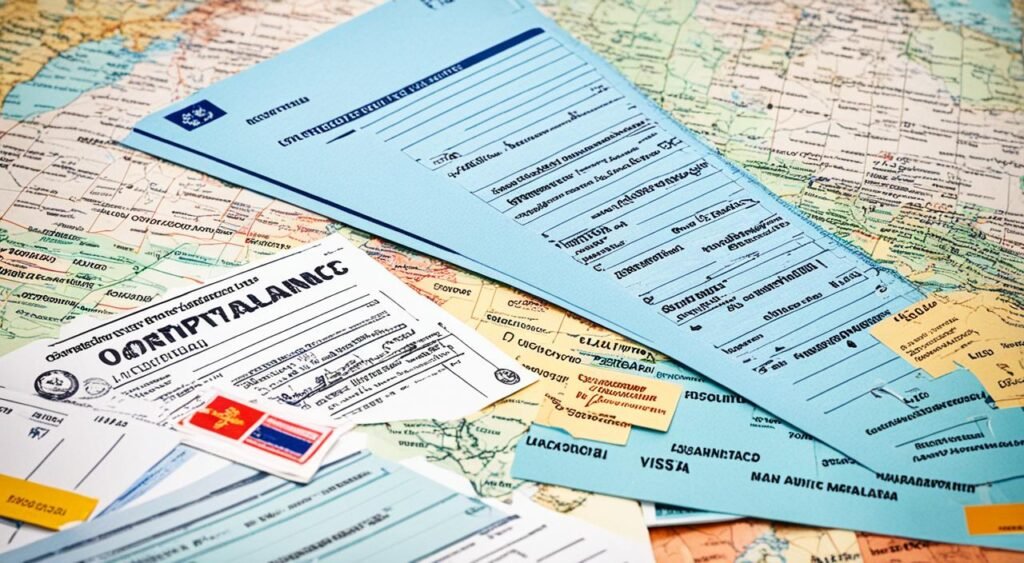Preparing to study abroad is an exciting journey that starts with careful planning. Look into various study abroad programs that match your goals. It’s essential to know the benefits of studying abroad. This includes learning about new cultures, gaining new perspectives, and acquiring skills that are highly valuable. Keep in mind, there are different types of study abroad programs to fit your needs, offered around the world. Important factors to consider when selecting a program are its location, costs, academic courses, and available support services.
Key Takeaways:
- Do your homework, and choose a study abroad program that fits what you want to achieve academically and personally.
- Recognize the upsides of studying abroad, like fully experiencing a different culture and picking up important life skills.
- Look at the range of programs available, from those that are just a few weeks to longer stints abroad.
- When making a choice, think about where it will be, how much it costs, what you’ll study, and who’s there to help you in need.
- Get ready for your abroad adventure by making sure you have all the necessary paperwork and sorting out your travel plans.
Introduction to Study Abroad Programs
Studying abroad has many benefits. It lets you dive into a new culture, grow your view of the world, and learn cross-cultural skills. By living and studying in another country, you will deeply understand global views and boost your language skills.
This experience makes students more flexible and self-reliant. It lets them try new academic paths and learn in varied ways. They might even earn credit toward their degree. Plus, it impresses future employers, who love skills from studying abroad.
Benefits of Studying Abroad
Going overseas for studies brings you closer to the world. It lets you truly get to know another culture, learn new languages, and see life from various angles. You become aware of different customs and ways of thinking.
These skills help you stand out in the global job market. Employers appreciate seeing these experiences on your resume.
Also Read: What Are Elective Courses In University?
Types of Study Abroad Programs
Study abroad options vary to meet student interests and needs. There are short programs, ideal for language learning or cultural dives. These often last from a few weeks to a semester.
Longer programs, like spending a year abroad, let students really become part of their host country. They may also include internships or service-learning. No matter the length, students can pick from a wide range of destinations. This choice can be based on what they’re studying or just their personal curiosity.
Popular Universities for International Students
Top universities worldwide draw in many international students. The US, UK, Canada, Australia, and Europe are big hits. These schools offer lots of support for students from other countries. They arrange for places to live and fun things to do.
Some work with colleges in other countries, making it easier to study abroad. This gives students even more options for international study.
Securing Essential Documents

Getting the right documents for study abroad is very important. Make sure your passport stays valid for six months after you plan to come back. If you’re going to a place that needs it, you’ll also have to get a student visa. The rules for getting a visa can be different in each country. That’s why it’s key to check ahead and give yourself plenty of time to get it sorted.
Speak with your study abroad advisor to make sure you have everything you need. This includes academic transcripts, proof of money, and any other forms they might ask for. Preparation is the way to go.
Also Read: What Is The Difference Between An Insurance Broker And An Insurance Agent?
Passport and Visa Requirements
For international students starting a study abroad journey, a valid passport and the right student visa are a must. The process of getting a visa changes depending on where you’re going. It’s your job to research and know the visa requirements. Your study abroad advisor and the school you’re going to can guide you.
They’ll help you understand what documents you need, like financial statements and extra forms. This guidance is crucial to smoothly navigate the visa process.
Academic Transcripts and Application Materials
Along with your passport and visa, you’ll need to collect your academic transcripts and other papers. Many programs want official academic transcripts. You might also need to give letters of recommendation or a personal statement.
Before you apply, review what your program needs carefully. Then, make sure to send everything on time for a hassle-free application process.
Finding Suitable Housing

Getting the right housing is key before you study abroad. Universities and study programs usually have on-campus
student dormitories and residence halls
for international students. These places are great for living, packed with things international students need. You get to know people from all over, making it easier to fit in. When you look for a place to live, think about how close it is to school, the cost, and if there are spots to hang out. Plus, check out what kind of help and activities they offer.
Homestays and Host Families
Choosings a homestay is a good way to dig into the new culture and lingo. Living with a local family can really help you learn and understand more. But, you’ll need to follow the family’s rules. Look into details like meals and what you’ll need to do at home. This will help you decide if it fits your study abroad plans.
Also Read: What Is A Claims Adjuster And What Do They Do?
If you like your own space and freedom,
private apartments or shared housing
is a good choice. Renting an apartment or sharing a place with students like you offers lots of freedom. It can save you money compared to the other choices, too. Just know that you’ll have to find a place, sign a lease, and share chores. Make sure to research where to live well, budget right, and think about how you’ll get to school or around town.
Booking Travel Arrangements
Organizing your trip to study abroad is a big part of your travel planning. It’s best to book flights about 3 months before to get the lowest prices. Also, think about if you can be flexible with your travel dates. Being flexible can add extra days for international travel or sightseeing.
Before booking, look into the airline’s rules on what baggage you can bring and any travel-related restrictions. Using student travel agencies or discounts can cut down on international flights costs. It’s also smart to arrive a couple of days early. This helps your body get used to the new time zone and placement before you start your studies.
| Travel Arrangement Factors | Recommended Actions |
|---|---|
| Booking Flights | Book at least 3 months in advance to secure best rates |
| Flexible Travel Dates | Consider flexibility to allow for additional travel before/after program |
| Airline Policies | Familiarize with baggage, carry-on, and other restrictions |
| Student Travel Discounts | Take advantage of student travel agency offerings to save on flights |
| Arrival Time | Arrive a few days early to acclimate before program start |
Health and Safety Preparation

It’s crucial to look after your health and safety when getting ready for studying abroad. Talk to your doctors, like your primary care physician and specialists, about any health issues you have. Ask about vaccinations you might need and if your prescription medicine is available where you’re going.
Make a health care plan for your time overseas. Include finding local medical help and understanding how the health system works there. Also, check for any health warnings or shots you must have before going. Being well-prepared keeps you safe during your trip.
Also Read: What Are The Benefits Of Term Life Insurance And How Are Premiums Calculated?
Obtaining Travel Insurance
Getting good travel insurance is key before studying abroad. Choose a plan that covers your health internationally and includes things like getting home in an emergency. It should also cover lost belongings or canceled trips.
Many schools or programs will have you sign up for a specific health insurance, like GeoBlue. Understand what your insurance does and does not cover. It’s wise to always have your insurance details with you while you’re away.
Safety Precautions and Emergency Planning
Think about safety as well. Check the travel advice from the U.S. Department of State for your study abroad location. Register with the Smart Traveler Enrollment Program (STEP). This lets the government help you while you’re out of the country in emergencies.
Know the number where you can reach the U.S. embassy or consulate if you need help. Learn about local laws and customs. Have a way to contact your family and friends fast if something happens. These steps make you ready for different kinds of trouble you might face abroad.
Also Read: What Is Academic Advising And Why Is It Important For University Students?
Financial Planning and Budgeting

Creating a budget is a key part of planning for studying abroad. First, find out how much the tuition, fees, and living costs will be. This includes things like housing, meals, and getting around, as well as books and extra spending money. Most schools and study programs have tools to help you know the total cost. Don’t forget to add in visa costs, insurance, and personal travel money. By making a detailed budget and checking financial aid options, you can make sure you have enough money for your international study time.
Tuition and Living Expenses
Figuring out the expenses of studying abroad is really important. You should look into tuition, fees, and what daily life costs. For living, think about where you’ll stay, how you’ll eat, and how you’ll get around. Knowing all the costs will help you organize your money better for this adventure.
Scholarships and Financial Aid
Good news! There are many ways to get help in paying for study abroad. Try for scholarships from your school, the place you’re going, and groups that back study abroad. You can get aid based on merit or need, and aid that’s only for going abroad. Plus, see if you qualify for federal help like Pell Grants or loans. Exploring these options can boost your chance of getting money for your study dreams.
Managing Finances Abroad
After you get your money plan ready, it’s time to learn how to use it well abroad. Tell your bank about your travel plans. It’s smart to set up online banking and get a debit or credit card with low fees. Know the local money and rates. Using services like Revolut or Wise can save you on currency fees. Also, learn about local money rules and deals for students.
Language and Cultural Immersion

Getting ready for studying abroad is key. Some students know the local language well already. But, others need to learn it from scratch. Thankfully, there’s a lot of help to boost language skills. This includes language apps, podcasts, online courses, and classes from the university.
Learning a few basic phrases and greetings is a good start. It helps students talk to locals and fit in better. So, mastering the local language, even a little, is important.
Language Learning Resources
There are many tools out there for learning a new language. For instance, apps like Duolingo, Babbel, and Rosetta Stone are great for interactive lessons. You can use them on your phone, whenever you have time.
There are also podcasts like Coffee Break Languages and Fluenz. They help with listening practice and teach you about the culture, too. Plus, don’t forget about online courses on platforms like Coursera and edX. They can give you a solid start in the language before you leave.
Cultural Etiquette and Local Laws
It’s not just about the language, though. Understanding a country’s cultural norms and laws is crucial. This helps you in everyday situations, so you don’t upset anyone unknowingly or break the rules.
Things that are fine in your home country might not be okay elsewhere. Being aware of these differences shows you respect the local culture. It also helps you make real connections and meet the society’s expectations. Being open and ready to learn is essential for a great cultural immersion.
Study Abroad Programs
Students should think about their goals and budget when choosing a study abroad program. They should think about what they want to study, how long they want to go, the place, and if they want to learn a new culture or language. Looking into what help they might get, where they could live, and what they can do for fun is also important. Talking to people who have been there, like advisors and other students, can give good advice.
Choosing the Right Program
Getting ready to apply is another step. This usually means sending your grades, letters from teachers, your thoughts on why you want to go, and possibly how well you can speak another language. Every program has its own rules and dates to remember, so it’s key to get organized. Many schools have an early time to apply, so be ready.
Application Process and Deadlines
Doing your homework on what’s out there and making a good plan can lead to an amazing time abroad. Studying in another country can really change how you see things, make you better at talking to people from different backgrounds, and potentially help your career. So, getting ready the right way is very much worth the effort.
Also Read: What Are The Benefits Of University Online Courses?
Conclusion
Getting ready for a study abroad trip involves lots of planning. You need to think of everything, from getting the right papers to finding a place to stay. Doing your homework on different study abroad programs, managing your money, and learning about the new culture and language will make your journey amazing.
Studying abroad brings many good things. It helps you see the world in a new way, gets you better at talking with people from different cultures, and can boost your job options. So, all the time and effort you put into getting ready is definitely worth it.
With a good plan and help, students can go on a study abroad program that fits what they want to learn. This journey won’t just help with school, it’ll also make you a better citizen of the world. You’ll get to live in another culture, travel for your studies, and meet students from all over. This opens a door to learning – both in and out of the classroom.
Learning to face new things and really dive into a new culture is hard, but it’s also one of the best parts of studying abroad. It makes you more flexible, tougher, and really aware of different ways of life. This journey changes you and helps you understand the world in a whole new light.
FAQs
What are the benefits of studying abroad?
Studying abroad has tons of benefits. It lets you dive into a new culture and open your mind. You will improve your language skills and learn to communicate with people from different backgrounds. This will give you valuable experiences for your future career.
What types of study abroad programs are available?
There are many study abroad programs to choose from. Some are short-term, like a few weeks to a whole semester, focusing on learning a new language or diving into a culture. Others last a whole academic year or semester, letting you dig deep into the host country’s culture and education. You might also find programs that mix in internships or service opportunities.
What are some of the most popular universities for international students?
Popular countries for international students are the U.S., UK, Canada, Australia, and Europe. These places often have special services for international students, like help with housing and fun activities. They make it easier for students from other countries to feel at home.
What documents do I need to prepare for a study abroad program?
To get ready for a study abroad program, you need a valid passport and sometimes a student visa. You should also prepare your academic records and other application stuff. It’s really important to check what you need for the country you’re going to and for your specific program. Make sure to get everything ready on time.
What housing options are available for study abroad students?
Students studying abroad can live in dorms, with local families, or in their own apartments. Each option helps you in different ways and offers various levels of independence. Think about how you want to live while you’re studying abroad to pick the best place for you.
How do I prepare for the travel and logistics of a study abroad program?
To prepare to travel for your study abroad, book your flights early. Learn about airline rules and plan to arrive a few days before your program starts to get used to the new place. Make sure you know how you’re getting from the airport to your school or housing.
What health and safety considerations should I have when preparing for a study abroad program?
It’s key to think about your health and safety when getting ready to study abroad. Talk to your doctor, get any needed shots, and find out where you can get medical help in your new country. It’s also wise to get good travel insurance and know how to stay safe where you’re going.
How do I fund my study abroad experience?
Figuring out your study abroad budget and looking for scholarships and aid is crucial. Find out how much your program and living costs are. Then see what scholarships, grants, and student aid you might be able to get to help cover those costs.
How can I prepare for the language and cultural aspects of studying abroad?
Learning about your host country’s language and culture before you go is smart. Spend time learning the language. Use apps or take classes and read up on the culture and laws. Keep an open mind and be ready to adapt to new ways.
How do I choose the right study abroad program for my needs?
When picking a study abroad program, think about what you want to learn. Also, think about the length and location of the program. Consider how much you’ll get to learn about the culture and language. Talking to advisors and people who’ve been in the program can help you choose well.
What is the application process for study abroad programs?
To apply for a study abroad program, you’ll need to send in grades, letters of recommendation, and personal essays. You might also need to show your language skills. Be sure to check what each program specifically needs and when they need it. Give yourself enough time to get everything together and apply.
Source Links
- https://international.collegeboard.org/students/studying-abroad/prepare
- https://www.gooverseas.com/blog/study-abroad-prep
- https://overseas.wustl.edu/prepare





